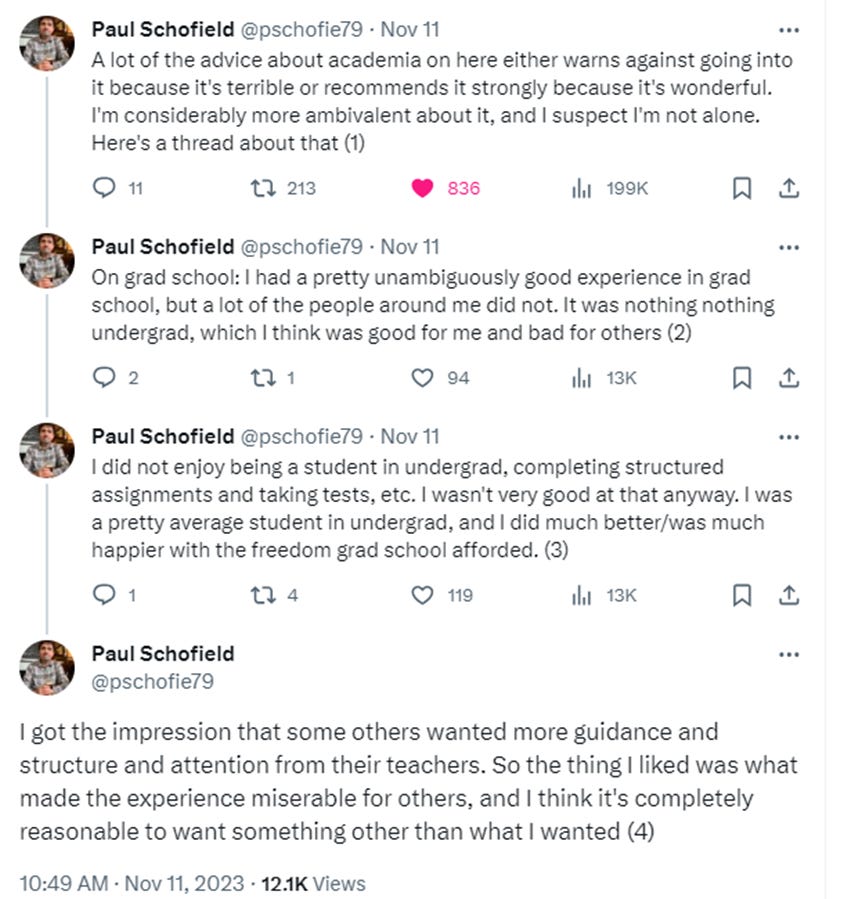A little while ago, I quote-tweeted this thread about academic life from Paul Schofield, a philosophy prof at Bates, noting that what really resonated with me was an almost-in-passing comment early on. I figure that’s worth unpacking a bit, so here’s a screenshot of the relevant bit:
The thing that jumped out at me was the comment about some people wanting more structure in grad school, while that was unappealing to him. A little further down he identifies this as a matter of personality types, and I think that’s correct.
What particularly resonated about this was that I’ve lately been chafing a bit at what sees to me to be a steady increase in both the actual amount of structure within academia, and also in the number of calls for even more structure. This is happening at all sorts of levels, from undergraduate to graduate to professional development for faculty, and I’ve found it to be some combination of mystifying and unappealing.
What the thread made me realize is that my reaction to this is probably a reflection of my personality in more or less the way that Schofield describes it. I wouldn’t go so far as to say that I didn’t enjoy being an undergrad— on the contrary, I had an absolute blast— but I definitely preferred the less structured bits of the educational process. I’ve always hated elaborate multi-stage assignments— the sort of thing where you do a proposal, then an outline, then a draft, then a final product— and really despised the sorts of classes that required taking notes in a particular format, etc.. I never did badly in them— the amount of effort involved in the stages was just enough to be irritating but not so much as to be a serious impediment— but I spent a lot of time quietly seething about the stupidity of these requirements.
I was an undergrad long enough ago that those things were more of a problem in high school than college— a large majority of my classes were just problem sets and exams— and grad school was basically the same. I tried to steer clear of classes that were known to involve more elaborate staged assignments, and was mostly successful in that.
The thing I really enjoyed was research, where I was more or less turned loose in the lab to do as I liked. Both in my undergrad summers and my Ph.D. program, I greatly enjoyed the freedom to just do… whatever. So grad school was generally a pretty positive experience for me, and that sense of freedom is a lot of what drew me to academia.
And that’s also why I find the recent trends both puzzling and irritating. In the twenty-mumble years I’ve been faculty, we’ve seen a really big increase in both the number of formal workshops for faculty development, and the structuring within those workshops. What used to be basically lecture/discussion sessions with lunch are now run like undergrad classes, with “pre-writing” and “think-pair-share” activities that make me want to stab a pencil into my leg so I can excuse myself to go to urgent care. I seem to be relatively isolated in this, though— there’s a seemingly boundless appetite among my colleagues for more structure and more elaborate structure in the ways that we teach, the ways that we’re taught, and the ways we evaluate each other. And that undercuts the freedom that has always been the chief attraction of academia as a career path, for me. I want to be left alone to do what I choose in the manner I see fit (within reason), but that doesn’t seem to be a widely shared desire, at least among the people who attend the same meetings I have to.
I’m not saying that there’s no value to any of this, but I think that most of the value accrues to students and faculty with a particular personality type, who are more comfortable with more structure. That’s very much not me, though, and I find myself chafing at the imposition of a lot of these measures. A lot of the people I work with look at the increasing formality of essentially all of our processes as a step in the right direction, and enthusiastically pitch even greater leaps forward into baroque curricula and systems of “peer evaluation.” I survey the same landscape and find myself hoping that the implementation process can drag on long enough for me to plausibly retire before having to deal with the end product.
I also wonder if this doesn’t play into the many-hands-wrung-over phenomena of decreasing approval of higher education in general. I suspect a lot of dissatisfaction has less to do with the pernicious influence of neoliberal capitalism or the pervasive left politics of the academy than the fact that the institutions of academia have slowly and steadily been reshaped in ways that cater to the preferences of a very particular personality type. Which necessarily and systematically makes those institutions less appealing to people whose preferences run in a different direction.
I think there’s a balance that needs to be struck, here, to meet the very real demand for more formality and structure on the part of some students and faculty, while still leaving room for those who would prefer a more free-form experience to thrive. I don’t know that we’re doing a very good job of that right now, and I worry that we’re heading in the wrong direction.
Well, that’s a cheerful thought for the last day of Fall term classes… Here’s a button if you want to enjoy more of my sunny disposition:
And if you want to either agree or take issue with any of this, the comments will be open:






I think about this a lot. My grad program was maximally unstructured and where I loved that, I really loved it. When I hated it, it was not because of the lack of structure but because that lack opened you up to serious threats from bad professors. I did one field with a professor who just handed me a list of things to read, didn't want to meet or talk about it ever, had no seminar I could join, and who was then profoundly hostile to me during my qualifying oral because in my written exam I challenged some of his pet theories. (I still thought that open debate and critical thinking was the point.) That's on me for being naive but in a more structured situation I might have seen it coming earlier and wised up before being in danger that way. I think generally that's what structure ought to be: guardrails at cliffs and hazards, but otherwise, make study a big old off-road paradise where you go where you want.
Agree with the general sentiment, my grad experience was very unstructured and its for that exact quality that I'll always treasure the experience.
But it was also very recent! My impression was that the amount of structure was very determined by the PI - some profs created intense internal structures for their group, and others were laissez-faire. Prospective students would arrive, meet with the profs, and attempt to self-sort by their inclination. I could see a lot of my peers benefiting from structured research programs, that it gave them more confidence, whereas others clearly felt stifled and unhappy. The best reform imo was therefore to give students more freedom to change research groups early on without any implication that they had 'failed to make it work' with their first PI.